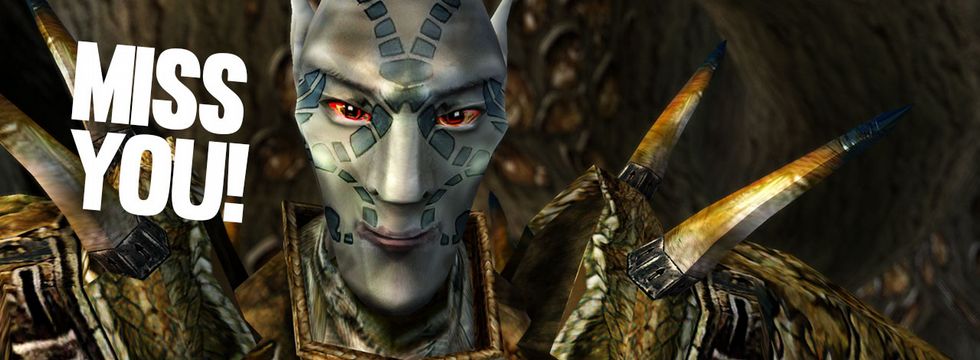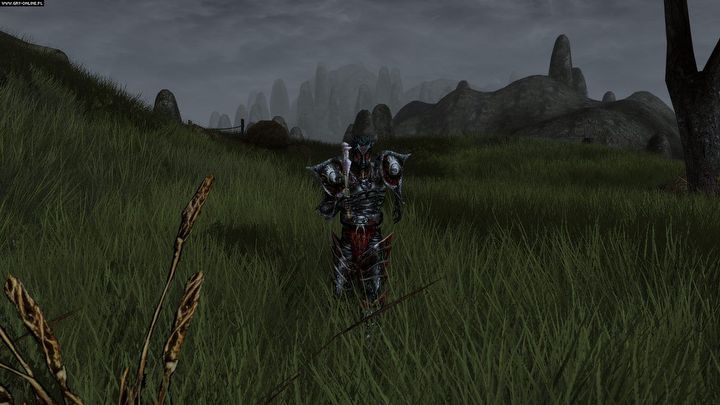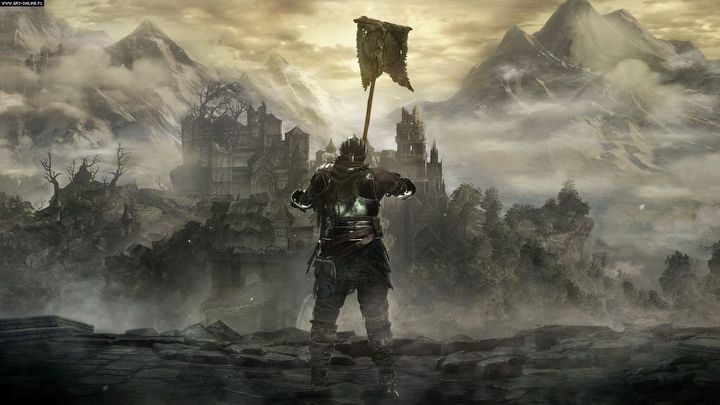author: Titus Stobinski
RPGs Are Too Easy. I Used to be a Pilgrim, Now I'm a Slave
In order to reach the broadest audiences possible, RPGs have become incredibly easy. But haven't we crossed a line, behind which with decrease of difficulty, fun also falters? I think we did.
Comfortable armchair and warm blanket, a teapot of aromatically steaming Earl Grey, and, of course, a pyramid of cheese & ham sandwiches with mayonnaise.
That's more or less what my evenings looked like while playing the most important RPG titles of my life. And it's a journey related to one of them that I'd like to invite you, dear reader, to join me on here.
Although years have passed, the most important masterpiece of the genre that I have ever played is still Baldur's Gate, which is currently on everyone's lips. However, it wasn't Baldur's Gate that taught me to embrace the void, properly recognize directions of the world, and constantly get excited about traversing miles of virtual space.
The game that did it was Morrowind – the third installment of The Elder Scrolls series.
The Red Mountain Penal Colony invites you
Oh, what a game it was! Brutal, full of dust, bandit hideouts and sepulchers – the northeastern region of Tamriel. Tormented by conflicts among the largest families of these lands, not hiding their natural lack of hospitality and the brutality of the Dunmers ingrained for generations. Covered in various kinds of supernaturally overgrown fungi and characterized by a frigid, though fairy-talish or even mystical, demeanor. It was right here, shortly after leaving the harbor village of Seyda Neen occupying a piece of the Bitter Coast, when I understood what freedom is and what it can offer in all its bitter beauty. We only have to allow it to lead us ahead, wherever our weary, wandering feet may carry us.
The ability of a good book is that it draws the reader into the vortex of the events portrayed in it. A good book doesn't speak outright, but gradually, through successive letters forming into words and words forming into sentences, it subtly flinches in our direction. It doesn't indicate a specific page where we will find the answer to the question that drives history.
It is not shouting at us: "Oh, it's him, this is the man who's responsible for all the murders in the picturesque British countryside!” A good book flirts, and doesn't immediately flaunt... it doesn't show everything right away.
And that was Morrowind – constantly tempting me with stories mentioned by encountered characters and found manuscripts. It dragged us into more paths of rock labyrinths and made us go deeper and deeper into them. Morrowind also did something, as probably one of the last such big games, something that made me dedicate the lion's share of my article to this particular game more than twenty years after its launch – it didn't treat me like an infant.
The game didn't try to force solutions that would reduce the gameplay to the level of mindless clicking. Of course, there are genres in which simplified mechanics and rules make us spend dozens of hours with them – it's supposed to be simple and pleasant, and it is. However, I never wanted RPGs to go in this direction, I never expected to be led by the hand and have everything served for me on a silver platter.
The word perfectly describes hundreds of hours spent with TES III – there was nothing else but "reading.” Delving into thousands of undubbed dialogue lines, and then leafing through page after page of my faithful journal, where instead of markers pointing to a specific place, we could get some vague coordinates. Wandering to track down the Drethan family mausoleum. Lack of ingredients for necessary potions, lack of a safe place to rest – all this to find a reference point for further journey. The point saying that from now on we should head southeast. And travel till we come across that one fallen and bug-eaten tree. This exact one, which will help direct us to the actual goal of our journey.
Existential nihilism in virtual worlds
I miss the anger, the fatigue, and those few-minute breaks meant to give a bit of respite. I miss that damn satisfaction when I finally managed to get to the lair of my target, only mentioned by name on a scroll received from the nefarious Morag Tong organization. I miss contemplations on how to eliminate one particular scum without raising unnecessary fuss – and how to do it with class. After all, a real assassin should not hide behind a piece of paper with a seal of nearly governmental rank, which alone would allow the sentence to be executed safely.
I remember the excitement that Oblivion caused. A true awake of the next-gen generation. I remember the beautiful visual side of the game, giving the best rigs a run for the money. Sights completely different, though no less interesting. Fresh province of Cyrodiil and the possibility of traversing it on the back of a mount. I also remember how the game was simplified by cutting out my favorite skills and that damn red marker on the map. Although at that rate, TES IV completely absorbed me, I experienced firsthand how much RPGs have changed over a few years.
There was no more room for conjecture, exploration, and mystery. Everything became stripped of secrets and obvious, like the first Christmas Eve after we overheard our parents' conversation and understood that Santa Claus is one big hoax. Sure, you could still find joy and appreciation in all that we've been gifted, yet - something has changed. The role of the journal has been marginalized, it has essentially become a simple list of all quest, because they had to be put somewhere. However, he was no longer that tattered, hefty volume, which served as support like the last faithful friend, when everyone else had already turned away from us.
Maybe because of the memories stuck in my head, I slightly romanticize the way the developers led us through the plot of their games. Or maybe I just got tired of this whole pseudo-narrative, full of empty, meaningless exclamation points, quests accomplished in a matter of minutes and characters bringing absolutely nothing to our adventure. Heck, if all these gameplay-simplifying markers were only optional, if they could simply be turned off…
The point is that modern titles have already entered so much into this pathological relationship with colored arrows that without them, completing even the simplest quest begins to border on the miraculous. NPCs you meet will not give you key information, drop hints or provide any clues. It is, after all, the job of the ever-visible marker to do everything for us.
Big in Japan
I'm head over heels in love with FromSoftware’s games, however, not because of their already legendary level of difficulty. This feeling is born through the freedom given to me through them – a freedom unconstrained by anything. The possibility of turning back in time and the feeling that here I am, standing again, with no signs and hints in front of myself, screaming what to do. Although this is an extreme case, far removed even from the Morrowind I described, I really have this sentiment.
The Japanese studio, while expecting me to devote many hours of my life to its work, at the same time shows how much it values my time. He manifests this through the stories he tells, which – though hidden under a thick guise of dried blood – are worth discovering every next page. Nothing is obvious here, nothing is directly said, shown nor marked. Nothing is worthless because everything has a message saying that it's worth getting involved.
And I guess that's the crux of my problem with contemporary games. These are "gamelike" products, whose creators seem to think that 60% of the original formula will preserve the quality and taste that has been known for many years. And here, unfortunately, there’s neither taste nor quality – only the stench of staleness mixed with the saltiness of nostalgic tears shed by those who remember how it "used to be.”
Are those times, and the way of creating games, which I remember so fondly, gone forever already? Certainly. It is important to think rationally and simply understand that some mechanics can no longer return, and definitely not to titles in the AAA segment. The audience here has grown torpid, used to the fact that more than ambitious, it’s just supposed to be comfortable and easy. And may there occasionally pop up a developer and publisher duo brave enough to decide to take such measures and give us a game that will allow for a bit more freedom? Once every few years – for sure.
That's a bit like crying over spilt milkand serving mustard from the fridge after the sausages have been consumed – it's too late for moaning, you should have complained when the changes were just crawling, man. But what can I do? I would like to get lost again, not necessarily in my hometown, not necessarily when Google Maps refuses to work. Just like that – virtually.
In the meantime, I will wait patiently so that I can once again get a teapot of Earl Grey, prepare a plate of sandwiches, and wrap myself in a warm blanket in a comfortable armchair.


